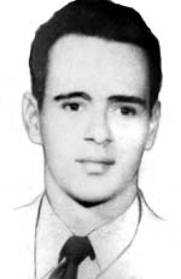4.1.3.8 Life and lyrical work of Raúl Gómez García (1928 – 1953), the poet of Moncada

Raúl Gómez García is one of many men for whom words have played a subordinate role to action. From a young age, he cultivated poetic writing without great pretensions except to capture his emotional experience of the world in the neo-romantic register common to his generation. However, he chose to lead the Revolution and used writing to express ideas that also had this purpose.
He studied Law and Pedagogy at the University of Havana and became involved with the Orthodox Party and the figure of Fidel Castro, a process during which he would foster his revolutionary convictions and polish his poetic instrument, under the influence of the ideas and aesthetics of Martí, which is the most directly intelligible lyrical influence in his works.
After the coup d’état led by Fulgencio Batista on March 10, 1952, he wrote the text “Revolution without Youth”, in which the core ideas that would guide his creative action can already be seen, not restricted to the realm of poetry but predominantly in the transformative action on his immediate reality, burdened by subservience, political corruption and already by the bloody hues of criminal repression.
Known as the poet of Moncada, he drafted his manifesto and became involved in the assault on the military barracks with the aim of unleashing armed struggle, based on the popular outrage provoked by the de facto government established by Batista. He died not as a result of combat wounds but from the violent torture he suffered as a prisoner, beaten to death for his continued silence.
The words of Basilia Papastamatiu serve to illustrate his legacy, and they also extend to a whole host of young people who dedicated their lives to the revolutionary cause, including Frank País, the brothers Luis and Sergio Saíz, and others:
“Because these young people understood that at a time like that they could not confront it with words alone, and they decided on the language of violent gestures, of direct, corporal action, a harsh and risky language whose use not a few even had to sign with their own death the text they were writing, which was the text of the revolution.”
His lyrical work would undoubtedly have been more extensive and profound had he not died at such an early age. Imbued with the neo-romanticism of his generation, we can see, in addition to the influence of Martí, a certain imprint of Casal regarding the spiritualization of love. Some of his poems were unfortunately lost as a result of the repression that his family also suffered after the vile murder. Those that survived were compiled and made public in 1971 by Basilia Papastamatiu. Some of them have been well received, regardless of Raúl’s revolutionary merits, for example, the one entitled “Paradox”:
“That dreamed kiss was lost in the thicket
That golden dream turned into a soft calm
That worthy passion that life gave me
That welcomes among some verses for feverish and for saintly
She lies almost forgotten in the withered corner
And of all his fury only a wound remains.
All those eyes that saw our desires
Throbbing thirstily in the fibers of the soul
They no longer usually watch us slide back with time
The hidden passions of supreme nostalgia
And the lips that spoke of our already dead love
They are now talking about other things, biting and happy.
It all seems to be over… There is a calm
That drowns your eternal cries in its silence…
My verse has not flowed from my pen for months.
The dignified epilogue that (illegible) and overwhelming
From this novel of ours it seems that it already points…
Today I saw her, I saw her and I don’t understand
How despite everything seeming over
He looked at me eloquently with those black eyes…
As if naively appreciating his ignoble kisses…
Is it perhaps the mouth that crashes into his lips
Not even in my death did he learn to possess them?








